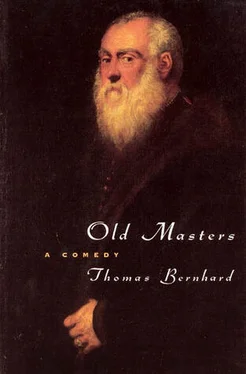way she said the word
Engelskopf was quite ghastly. I was unable at first to say whether the interpreter had come from Russia with the Russian group or whether she was one of those Russian
émigrées who had come to Vienna after the war and who are still coming to Vienna, those Russian Jewish
émigrée women who are highly intelligent and who have always set the fashion behind the scenes in Vienna, which has invariably been of advantage to Viennese intellectual society. These Russian Jewish
émigrée women are the real intellectual seasoning of Viennese society life, they have always been just that, without them Viennese intellectual life would be uninteresting. Admittedly these people, if, as it were, they turn megalomaniac and try to dominate absolutely everything, also soon get on your nerves, but then this woman interpreter was not exactly a prime example of the kind of Russian women
émigrées I have in mind, if indeed she was such a Russian
émigrée; she looked to me more as if she had come to Vienna from Russia with her Russian group, the way she spoke to the Russian group in
their Russian argued against the assumption that she was a Russian
émigrée and in favour of her having come to Vienna with the Russian group, and quite possibly arrived in Vienna from Russia only that very day, at least that is what I immediately thought when I had taken a closer look at her clothes, in particular her boots, there was in fact nothing Western about her, she probably was a communist who had been trained as an art historian, I thought as I scrutinized her from head to toe, as it were, the moment I had an opportunity to do so. The Russian women
émigrées I have mentioned, after all, dress in a predominantly Western manner, albeit not as Western as real Westerners, but in a Western manner all the same. No, that interpreter is not a Russian
émigrée, I thought, she crossed the frontier with the Russian group last night and did not even sleep last night, any more than the Russian group in her charge, the group has come to the museum straight from Russia, as it were, and straight from their dirty bus, I thought, that's what she looked like, that's what the woman interpreter looked like, that's what the group looked like. Because the Russian group was blocking my view I could not now see the velvet settee in the Bordone Room, I could not therefore see whether Reger was still outside or whether he had meanwhile returned to the room. The Sebastiano Room, where I was standing pressed against the wall, is the worst ventilated room in the Kunsthistorisches Museum, and of all places, I reflected, I had to be pushed against the wall by the Russian group in the Sebastiano Room, and of all people, I reflected, by such a crowd smelling of garlic and mud and dampness. I have always detested crowds, I have avoided them all my life, I have never gone to any meeting, no matter what, because of my detestation of crowds, just as Reger, incidentally, had not either, I hate nothing more profoundly than the multitude, than a crowd, I continually believe, even without seeking them out, that I am going to be crushed by the multitude or by the crowd. Even as a child I avoided multitudes, I detested crowds, the accumulation of people, the concentration of vileness and mindlessness and lies. Much as we
should love each individual, I believe, so we hate the mass. Of course this Russian group was not the first I had encountered at the Kunsthistorisches Museum or that, as it were, assaulted me at the Kunsthistorisches Museum and pushed me against the wall, Russian groups have lately been coming to the Kunsthistorisches Museum in greater numbers, indeed it seems as if there are now more Russian groups at the Kunsthistorisches Museum than Italian ones. The Russians and the Italians always appear at the Kunsthistorisches Museum in groups, whereas the English never appear in groups but always on their own, the French likewise always appear on their own. There are days when the Russian guides, men and women, have a shouting match with the Italians and the Kunsthistorisches Museum becomes a shouting house. That, of course, mostly happens on Saturdays, that is on a day when Reger and I
never go to the Kunsthistorisches Museum; that Reger and I have come to the Kunsthistorisches Museum today, on a Saturday, is an exception to the rule and, as can be seen, we have done well not to go to the Kunsthistorisches Museum on a Saturday, even though admission on Saturdays is free, as it is also on Sundays. I would sooner pay those twenty schillings for a ticket, Reger said to me once, than be exposed to those ghastly groups. Exposing oneself to groups of museum visitors is a punishment of heaven, I cannot think of anything more terrible, Reger said to me once. No doubt it was a punishment of heaven for him, albeit a self-invited one, that he made an appointment with me at the Kunsthistorisches Museum on this Saturday of all days, I thought, wondering about his purpose and unable to answer my question. Needless to say I should also have liked to know what it was Irrsigler had whispered in his ear, the first time it was something which evidently did not concern him in the least, and the second time it was something which made Reger immediately get up from the settee in the Bordone Room and walk out of the Bordone Room. Irrsigler misses no opportunity to point out that his is a
position of trust, it is touching the way he says it, and he says it so often that it becomes more touching with each repetition. Irrsigler nods his head when Reger arrives and he spots him, he does not do so when he sees
me. Three times already Irrsigler has received a loan from Reger for the purpose of furnishing his flat, a loan over several years, which he did not in the end have to repay to Reger. Reger had repeatedly made Irrsigler presents of clothes he no longer wears, truly top-quality treasures from the most superb tweed material; as Reger once said to me:
everything I wear comes from the Hebrides. But Irrsigler gets little opportunity to wear Reger's sartorial treasures because all week long he is on duty in his uniform at the Kunsthistorisches Museum, except Mondays, but on Monday he is at home in his dungarees because his Mondays are invariably taken up with domestic jobs. He does everything himself. He does his own painting, he does his own carpentry, he nails and drills and even welds everything himself. Eighty per cent of all Austrians spend their leisure time in dungarees, Reger maintains, and most of them even on Sundays and holidays, the majority of all Austrians walk around in working clothes on Sundays and holidays, painting and nailing and welding. An Austrian's leisure hours are his real working hours, Reger maintains. Most Austrians do not know what to do with their leisure time and so they will kill it dull-wittedly. All week long they sit in their offices or stand at their workplaces, Reger says, and invariably on Sundays and holidays one can see them, without exception, slipping on their dungarees and performing jobs at home, they paint their own four walls or hammer nails into their roofs or wash their cars. Irrsigler, Reger says, is such a typical Austrian, and the Burgenlanders are the most typical Austrians anyway. A Burgenlander gets into his Sunday best for only two, or at the most three hours once a week to go to church, the rest of the time he wears his dungarees, which are his working clothes, and this he will do as long as he lives, Reger says. A Burgenlander works all the week in his dungarees, he sleeps strikingly little but well, and on Sundays and holy days he goes to church in his Sunday best to sing a hymn to the Lord, only to slip out of his Sunday best and back into his dungarees immediately afterwards. A Burgenlander is still a typical peasant even in today's industrial society, even if a Burgenlander has worked in a factory for a number of decades he still remains the peasant his ancestors were, a Burgenlander will always be a peasant, Reger says. Irrsigler has lived in Vienna for a great many years and yet he has remained a peasant, Reger said. A peasant, incidentally, has always been comfortable in uniform, Reger said. A peasant either remains a peasant or he slips on a uniform, Reger said. If there are several children one will remain a peasant and the rest will slip on a state uniform or the Christian Catholic uniform, this is how it has always been, Reger said. A Burgenlander is either a peasant or he slips on a uniform; if he cannot be a peasant or slip on a uniform he inevitably comes to grief, Reger said. The peasantry, when it wished to escape from peasantry, has always, for centuries, escaped into a uniform, Reger said. Irrsigler, he believed, had been lucky because posts as stateemployed attendants at the Kunsthistorisches Museum only come up every few years, in fact only when one of the attendants leaves or dies. Burgenlanders were favoured for employment as museum attendants — why, that he, Irrsigler, could not say, but it was a fact that the majority of museum attendants in Vienna were Burgenlanders. Probably, Irrsigler suggested on one occasion, because Burgenlanders were regarded as particularly honest but also as particularly stupid and undemanding. Because they, the Burgenlanders, even today still had an
Читать дальше












